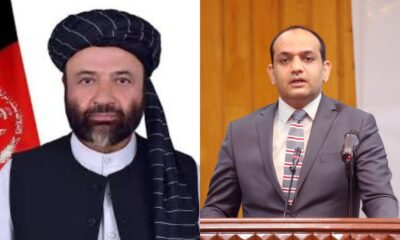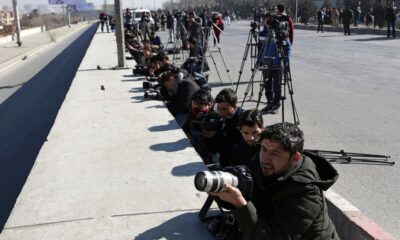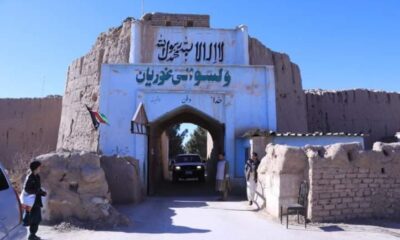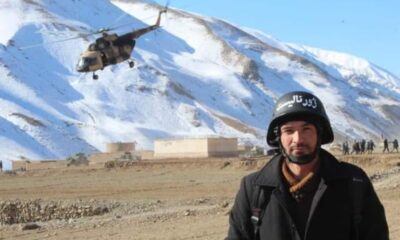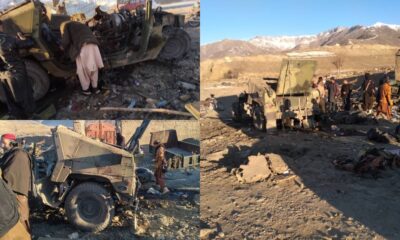Latest News
Afghanistan, Pakistan agree on shared vision for peace and stability
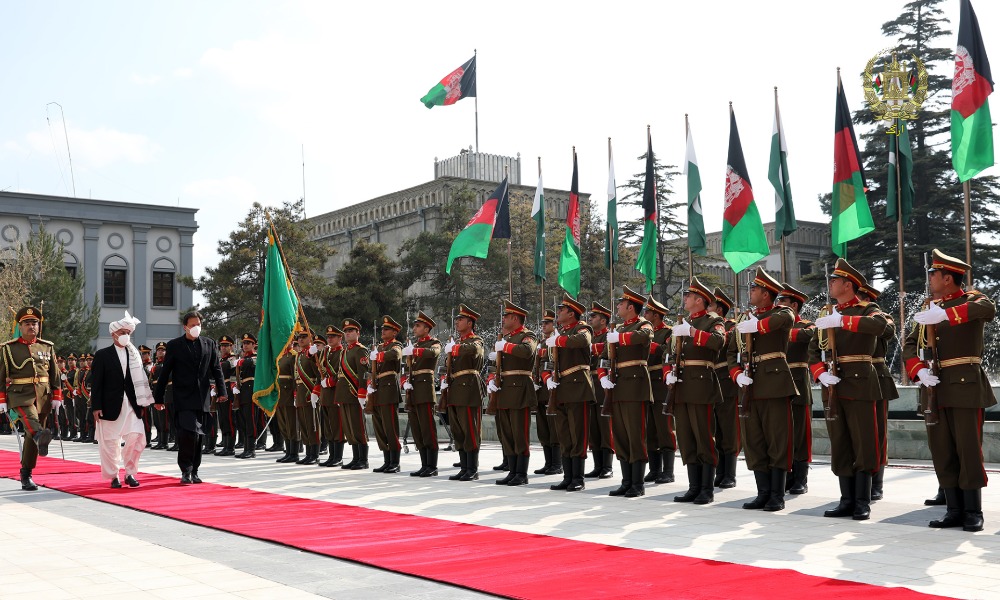
Pakistan’s Prime Minister Imran Khan on Thursday arrived on a day-long visit to Afghanistan where he met top Afghan government officials including President Ashraf Ghani.
According to Presidential Place the two side discussed a number of important issues pertaining to the Afghan peace process, bilateral relations and cooperation between the nations on mutual interest.
The Afghan Ministry of Foreign issued a statement on Thursday evening, saying the two countries have agreed on a shared vision to support peace and stability in both countries and the wider region.
“During the visit, an agreement was reached on Shared Vision to Support Peace and Stability in both countries and in the wider region.’ The document is highly important and the basic principles of the document are about cooperation between the two countries, cooperation in the field of peace, security and economic development,” the ministry statement said.
The document states that both parties welcomed the start of the Afghan peace process in Doha on 12 September 2020 and hoped that the talks will bring lasting peace and tranquility to the Islamic Republic of Afghanistan.
“They affirm their intention that both countries should look towards a future relationship built on trust, aiming to achieve tangible outcomes from that relationship. They note that closer and fraternal relations between the Islamic Republic of Afghanistan and the Islamic Republic of Pakistan would be beneficial, desirable and achievable, as indeed they had been in the decades before the latest conflict in Afghanistan,” the document says.
Afghanistan and Pakistan agreed that a shared vision for Afghanistan and Pakistan should comprise the following core elements:
1. High Ranking Representatives of Islamic Republic of Afghanistan and Islamic Republic of Pakistan met on 30 September 2020 and agreed upon the fundamental principle that Islamic Republic of Afghanistan and Islamic Republic of Pakistan should determine a new shared vision to help each other in furtherance of peace and stability in both their countries as well as the wider region.
2. They welcomed the start of Afghanistan Peace Process in Doha on 12 September 2020 and hoped that the talks will bring lasting peace and tranquility in Islamic Republic of Afghanistan. Talks have provided a unique opportunity to Afghans to decide their future without interference.
3. They affirm their intention that both countries should look towards a future relationship built on trust, aiming to achieve tangible outcomes from that relationship. They note that closer and fraternal relations between Islamic Republic of Afghanistan and Islamic Republic of Pakistan would be beneficial, desirable and achievable, as indeed they had been in the decades before the latest conflict in Afghanistan.
4. They agree, a shared vision for Afghanistan and Pakistan should comprise the following core elements:
a. That the Islamic Republic of Afghanistan and the Islamic Republic of Pakistan should enjoy a special relationship, founded on predictability, transparency, mutual and full respect for one another’s sovereignty, and on expanding and furthering their mutual interests through State-to-State mechanisms. That the mutually agreed cooperation framework under APAPPS provides a comprehensive, multi-sectoral mechanism for optimizing bilateral cooperation.
b. That the Islamic Republic of Afghanistan’s posture of “multi alignment” with other countries, pursuing a number of friendly relationships, presents a real opportunity for the two countries to exploit and conversely presents no threat.
c. That neither country could achieve lasting peace and stability without peace and stability in the other. Lasting peace implies peace-making which is wholly inclusive, encompasses the whole nation, and respects a democratic constitutional order in which rights of women and men remain inalienable and protected.
d. That neither country’s territory should be used for malicious purposes against the other’s territory, and that both countries should work together to identify and tackle enemies of peace, irreconcilables and those who undermine the peace process.
e. That the two countries should further their links and connections in a number of different ways, including through people to people contacts, business to business, government to government and, of particular note, security to security ties.
f. That regional connectivity should be broadened and deepened, with an emphasis on trade, free movement of people, goods and services, opening of trade and customs posts, and transport and energy infrastructure development, aiming for regional development dividends greater than what each country might expect to achieve alone.
g. That expeditious resolution of the refugee situation, i.e. the safe, time-bound and dignified return of refugees, would help the two countries address the humanitarian and socio-economic challenges associated with population displacement. Refugee returns would require resourcing, including donor support from the widest and the most inclusive possible donor community.
Part – 2
Implementation and Next Steps
1. The representatives of the Islamic Republic of Afghanistan and the Islamic Republic of Pakistan agree that timely progress to meet this vision would require close coordination, a structured dialogue, and willingness to take difficult and courageous decisions. They agree the need for urgency in their approach, with progress needed by the beginning of December 2020. Confirming commitments made on previous occasions, they agree to take rapid action on three main strands of activity, including identifying lead officials to take forward each activity:
a. By 15 December 2020: Re-energizing joint intelligence services-led work on analyzing, mapping and cooperating against enemies of peace and those undermining the peace process.
b. By 1st January 2021: A joint proposal for refugees return, elevating and intensifying treatment of this issue, to the point where credible and progressive action can start to be taken.
c. By 1st January 2021: A joint proposal to further regional connectivity, in a way which strengthens both Afghanistan and Pakistan, but also the wider region.
2. On Next Steps:
a. That the government leaders of the two countries will visit each other’s capital alternately to keep the momentum going. This initiative has commenced with the visit of the Honourable Prime Minister of the Islamic Republic of Pakistan to Kabul.
b. President Ghani would plan a reciprocal visit to Islamabad in the first quarter of 2021.
c. That the Islamic Republic of Afghanistan will share with the Islamic Republic of Pakistan summary of the key issues that are being discussed during the Afghanistan Peace Process.
3. Both sides agreed to keep this shared vision, its commitments, and previous commitments under regular review, to ensure measurable, clear and irreversible steps towards furthering closer and more productive relations between their two countries.
Latest News
Citizens concerned about increase in food prices across Afghanistan

A number of citizens are concerned about the increase in food prices in Afghanistan and have said that despite the decrease in the value of the US dollar against the Afghan currency, the price of raw materials has not come down.
They want the relevant institutions to seriously monitor the markets.
“When the dollar goes up, traders will raise commodity prices to the sky. When the dollar goes down, prices remainy the same. They do not lower the prices. I wish that when the dollar goes down, commodity prices will also go down because people are poor. Cruelty won’t help,” Mujibur Rahman, a resident of Takhar, said.
Noor Ahmad Shah, a resident of Kunduz, said: “Dollar rate has come down, but the traders are unfair. The government does not pay attention either.”
Some shopkeepers say that if the prices are determined by the wholesalers, the Ministry of Industry and Commerce should pay attention to this and prevent hoarding.
Amanullah, a shopkeeper in Kabul, said: “I expect the government to monitor prices. Traders should be told to sell according to market prices. Traders are responsible for high prices. Shopkeepers and retailers are not involved. We only take 10 or 20 afghanis profit and sell.”
Kabul Municipality says that it has set a price list for sellers and does not allow anyone to sell at high prices.
Nematullah Barakzai, the press adviser of Kabul Municipality, says: “Kabul Municipality is working seriously to control prices according to its rules. Prices are good as dollar rate has stabilized. Hotline 155 is at the service of all citizens. If someone sells at high prices, the responsible teams will take care of it urgently. We expect traders to help citizens in the holy month of Ramadan.”
Every year, during the holy month of Ramadan, commodity prices rise leaving many people unable to pay for their basic needs.
Latest News
Turkish envoy meets with OIC for talks on Afghanistan
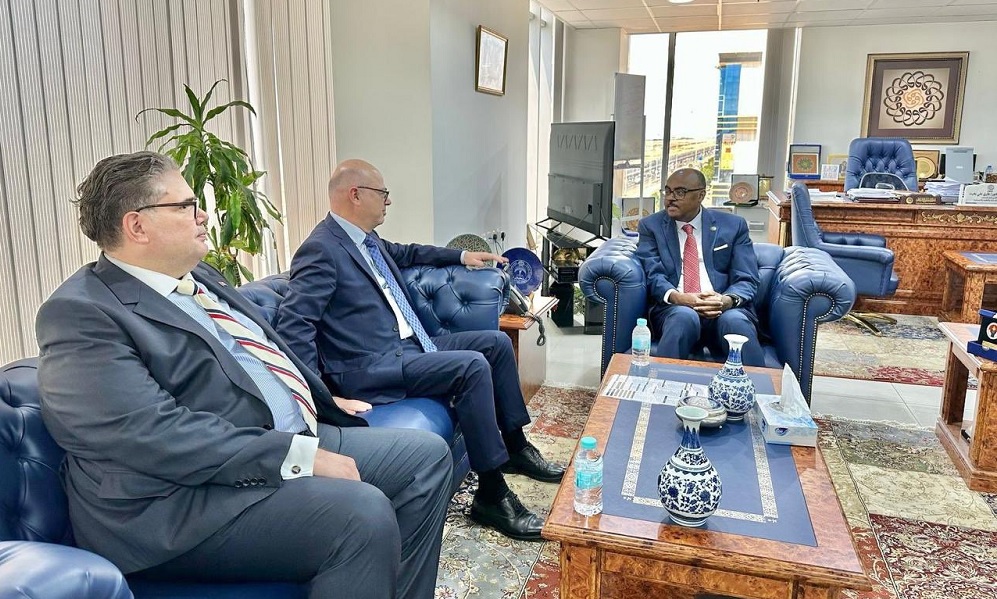
The Organization of Islamic Cooperation’s (OIC) ambassador Tarig Ali Bakheet met with Cihad Erginay, the director general of South Asia of Turkey’s Ministry of Foreign Affairs , on Sunday for talks on various issues including the situation in Afghanistan.
At the meeting, which took place in Jeddah, Saudi Arabia, both sides shared viewpoints on political, economic and humanitarian aspects of Afghanistan and discussed possible avenues of cooperation.
They explored ideas and approaches to address the key concerns in the light of relevant OIC resolutions.
The meeting underscored the importance of sustained engagement to support the Afghan people and pursue constructive dialogue with the de facto authorities on various issues.
Bakheet acknowledged and appreciated the positive role and contributions of the Republic of Türkiye towards advancing the objectives set forth in the OIC resolutions.
Both sides reaffirmed their commitment to continue exchange of notes to advance shared goals of peace, prosperity and stability in Afghanistan.
Latest News
Pulling plug on Ukraine would ‘be worse than Afghanistan’, US senator says
Graham’s comments came just days after the Trump administration halted military aid and intelligence sharing with Ukraine.
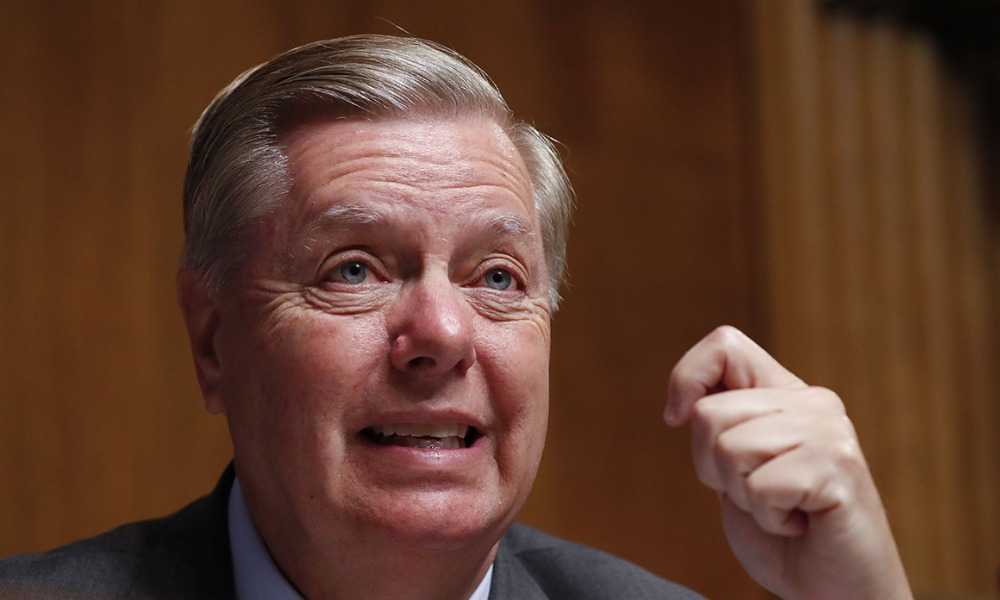
A senior US senator warned on Sunday that Ukraine could face disastrous consequences if the United States doesn’t resume military aid and intelligence sharing.
Lindsey Graham, who is also a member of President Donald Trump’s Republican Party, said in an interview with Fox News that the Ukraine needs to get intelligence and weapons for as long as there is fighting.
“If we pull the plug on Ukraine, it would be worse than Afghanistan,” he said.
“In terms of Russia, I’ll be introducing sanctions on their banking sector and their energy sector next week, urging them to get to the table.”
“If they don’t engage in ceasefire and peace talks with the administration, we should sanction the hell out of them,” he added.
Graham’s comments came just days after the Trump administration halted military aid and intelligence sharing with Ukraine.
Defense Secretary Pete Hegseth on Thursday confirmed that the US has paused military aid to the former Soviet republic.
-

 Sport4 days ago
Sport4 days agoAfghanistan’s futsal team to face Greenland in Brazil tournament
-

 Sport4 days ago
Sport4 days agoAfghanistan beat Greenland 5-4 in Brazil futsal tournament
-

 Business5 days ago
Business5 days agoUzbekistan set to open permanent trade center in northern Afghanistan
-
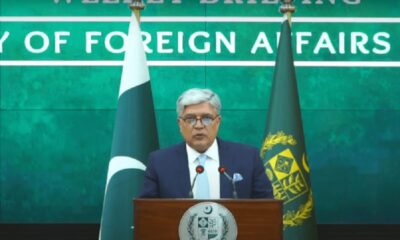
 Latest News4 days ago
Latest News4 days agoPakistan backs Trump’s push to recover military equipment left behind in Afghanistan
-

 Latest News4 days ago
Latest News4 days agoAfghanistan ranks ninth in 2025 Global Terrorism Index
-

 World4 days ago
World4 days agoTrump says he will go to Saudi Arabia to reach $1 trillion deal
-

 International Sports5 days ago
International Sports5 days agoFIFA announces massive $1 billion prize pool for Club World Cup
-

 Sport5 days ago
Sport5 days agoChampions Trophy: Williamson praised for propelling New Zealand to semi-final win


